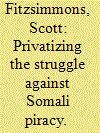|
|
|
Sort Order |
|
|
|
Items / Page
|
|
|
|
|
|
|
| Srl | Item |
| 1 |
ID:
184046


|
|
|
|
|
| Summary/Abstract |
Although Donald Trump’s foreign policy behavior is often characterized as erratic and unpredictable, he was remarkably consistent in his hostility toward international agreements. The president withdrew or threatened to withdraw the United States from several agreements and consistently characterized agreements as ‘horrible deals’ that ‘cheat’ his country. This article explores why Trump exhibited such consistent disdain for international agreements. To address this question, it develops propositions that draw a causal link between a leader’s personality traits and their willingness to challenge constraints: a leader with a relatively high belief in their ability to control events is more likely to challenge constraints than a leader with a lower belief in their ability to control events; moreover, a leader with a relatively high level of distrust of others is more likely to challenge constraints than a leader with a lower level of distrust of others. The article then conducts a plausibility test of these propositions in the context of Trump’s decisions to withdraw from agreements in three significant policy areas: trade (the Trans-Pacific Partnership), environmental stewardship (the Paris Agreement on climate change), and nuclear proliferation (the Iran nuclear deal).
|
|
|
|
|
|
|
|
|
|
|
|
|
|
|
|
| 2 |
ID:
119500


|
|
|
|
|
| Publication |
2013.
|
| Summary/Abstract |
Pirate attacks against commercial vessels in the Western Indian Ocean and nearby seas reached an unprecedented level in 2011. Despite concerted efforts by the international community and shipping companies to address this threat by conducting naval patrols and equipping commercial vessels with non-lethal defenses, the frequency of pirate attacks continues to increase. The general ineffectiveness of existing anti-piracy measures has sparked interest in expanding the use of armed private security contractors to protect commercial vessels from pirate attacks. This article argues that armed private security contractors can, indeed, enhance the security of commercial vessels because these actors can provide onsite protection for commercial vessels, which should allow them to respond very quickly to pirate attacks, and because these actors are willing to use deadly force against pirates. However, this article also argues that expanding the use of these actors may increase the degree of violence used during pirate attacks, pose threats to the safety of innocent civilians, and violate a number of domestic and international laws.
|
|
|
|
|
|
|
|
|
|
|
|
|
|
|
|
| 3 |
ID:
124790


|
|
|
|
|
| Publication |
2013.
|
| Summary/Abstract |
This article engages one of the most widely discussed but poorly understood aspects of the Iraq War: the use of violence by private security companies. It explains why, despite sharing several important characteristics-coming from the same general population of military and police veterans, working for the same client during the same time period, performing the same tasks under the same client-imposed rules of engagement, and facing the same kinds of threats in the same general operating environment-the personnel who worked for Blackwater, the chief protector of US State Department employees in Iraq, killed and seriously injured far more people than their counterparts in DynCorp. The article argues that Blackwater's personnel killed and seriously injured far more people in Iraq than their DynCorp counterparts because Blackwater maintained a relatively bellicose military culture that placed strong emphasis on norms encouraging its security teams to exercise personal initiative, proactive use of force, and an exclusive approach to security, which together motivated its personnel to use violence quite freely against anyone suspected of posing a threat. If the trends established during the Iraq and Afghan Wars continue, then private security companies will see extensive employment in future conflicts. These findings, consequently, have implications that extend beyond the Iraq War and the particular firms under study. Indeed, they indicate that governments and other future clients should analyze the military cultures of the firms vying for their business and use the results as a basis for deciding which firms to hire and, to a great extent, represent them in unstable conflict zones.
|
|
|
|
|
|
|
|
|
|
|
|
|
|
|
|
| 4 |
ID:
123040


|
|
|
|
|
| Publication |
2013.
|
| Summary/Abstract |
In November 1996, one of Africa's cruelest insurgent leaders, Foday Sankoh, conceded defeat and agreed to sign a peace treaty with the Government of Sierra Leone to halt that country's then-seven year long civil war. Sankoh's decision to stop fighting was not born out of a sense of goodwill toward his government or a shift in his political objectives. Rather, he agreed to make peace because his thousands-strong insurgency, the Revolutionary United Front (RUF), had been soundly defeated in a series of clashes against Executive Outcomes (EO), a mercenary force that fielded a mere 250 personnel. Seeking to explain this turn of events, a number of scholars have alleged that the mercenaries prevailed because they had access to more and better weapons than the RUF and, thus, made up for their lack of men with superiority in materiel. 1 Christopher Wrigley, for instance, argued that Executive Outcomes defeated the RUF, 'because it relied on sudden strikes made possible by its helicopters, which provided both transport and covering fire'. 2 Abdel-Fatau Musah, similarly, argued that EO succeeded in Sierra Leone because its 'air power' allowed it to deal, 'telling blows to the RUF on several fronts'. 3 Referring not only to EO's air assets, but also to its armored infantry fighting vehicles, Elizabeth Rubin concluded that the RUF, 'were overwhelmed by EO's superior firepower'. 4 Jacob Akol, likewise, concluded that, 'the RUF were overwhelmed by EO's firepower'. 5 These opinions are well-known to the mercenaries who took part in this conflict, one of whom acknowledged that, 'the world thinks that Executive Outcomes was successful because of the use of overwhelming technology and superior firepower'.
|
|
|
|
|
|
|
|
|
|
|
|
|
|
|
|
|
|
|
|
|